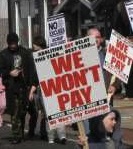
Householders in the 26-County state face hundreds of euro in new charges, starting with a flat-rate charge in January and separate water and property charges by 2014.
The Dublin government said a flat 100 euro annual household charge would be demanded from January next year, for two years, ahead of the introduction of a full property tax in 2014. The charge will be imposed on almost all properties, with only a tiny fraction set to be exempted for an inability to pay.
Left-wing parties called for an immediate boycott of the new charge, which they described as a regressive tax to fund the bailout of bankers, developers and speculators.
The government also said a new State utility company, Irish Water, would be set up shortly to install water meters in all domestic dwellings. That would pave the way for domestic water charges in two years’ time, it said.
The new charges will be the first local taxes to be introduced for more than 30 years.
Some 1.6 million households will have to pay the charge. Only 250,000 households, about 14 per cent, will be exempt. They include people in social housing owned by local authorities, families in receipt of the mortgage interest relief and people living in nursing homes or mental institutions.
Minister for the Environment Phil Hogan rejected appeals for exceptions to be made for those in mortgage arrears, negative equity, pensioners, carers or unemployed.
At a news conference, Minister Hogan accepted the tax would cause hardship, but presented it as the minimum possible charge he could have applied. However, he indicated that it will increase substantially next year.
Those who fail to pay on time will pay a penalty of 10 euro a month, he said. The legislation for the charge will include further details of penalties, including a possibility of imprisonment for persistent failure to pay.
Sinn Féin’s Aengus Ó Snodaigh said its “sweeping” nature would affect some of the poorest families in the State.
“By choosing to impose sweeping flat rate taxes on everyone the government is abandoning its pre and post election promises to protect the most vulnerable and families on low incomes,” he said.
“The implication of this charge will be that there is less money to spend in the local economy. This will further undermine the retail industry especially and lead to even more job losses in that sector.
He warned that the cost of installing water meters could be 1.5 billion euro, or three times the government’s estimates, a cost that could take a decade to be repaid.
“Instead of spending this money on installing meters the government should increase investment in the distribution and fixing the existing pipe network. This has the potential to save much more water and would pay for itself quicker. The money required to do this should be raised through progressive central taxation.”
The United Left Alliance said it would organise a nationwide boycott of the new flat tax. Socialist Party TD Joe Higgins warned the charge will rocket to 500 euro in a short time.
“The Household Tax announced by the government today is a burden too many for the majority of ordinary people,” Mr Higgins said.
A mass non-payment campaign, which was not affiliated to any political party or organisation, had begun to make it unenforceable, Mr Higgins said.
“A major series of public meetings in cities and towns around the country will kick off in September to establish local groups in what will be a very active campaign,” he added.
Asked about the threatened boycott, Mr Hogan insisted the charge would have to be paid, saying it would become “the law of the land like every other charge”.
“I would prefer not to have introduced any charge,” he said. “I was obliged to because of the loss of sovereignty and the programme with the EU and IMF.”
FAS DISBANDED
Meanwhile, a new agency is to replace the scandal-plagued education and training authority, Fás [Irish for ‘Growth’] agency, it was also announced.
The new agency, called Solas [Irish for ‘Light’] is intended to help overcome controversies over funds being diverted from the agency’s billion euro a year budget to subsidise sunshine holidays for political insiders.
One SIPTU union official, Matt Merrigan, was recently demoted over a seven-figure ‘slush fund’ scandal, which saw training funds for low-paid workers used to subsidise round-the-world vacations and other luxuries for union officials and cronies.
The reputation of former Minister for Health Mary Harney also never recovered after it was revealed she had availed of the government’s private jet, beauty treatments and five-star accomodation during a Florida junket to NASA’s Cape Canaveral, as part of one of the agency’s alleged training missions.
![[Irish Republican News]](https://republican-news.org/graphics/title_gifs/rn.gif)
![[Irish Republican News]](https://republican-news.org/graphics/title_gifs/harp.gif)

